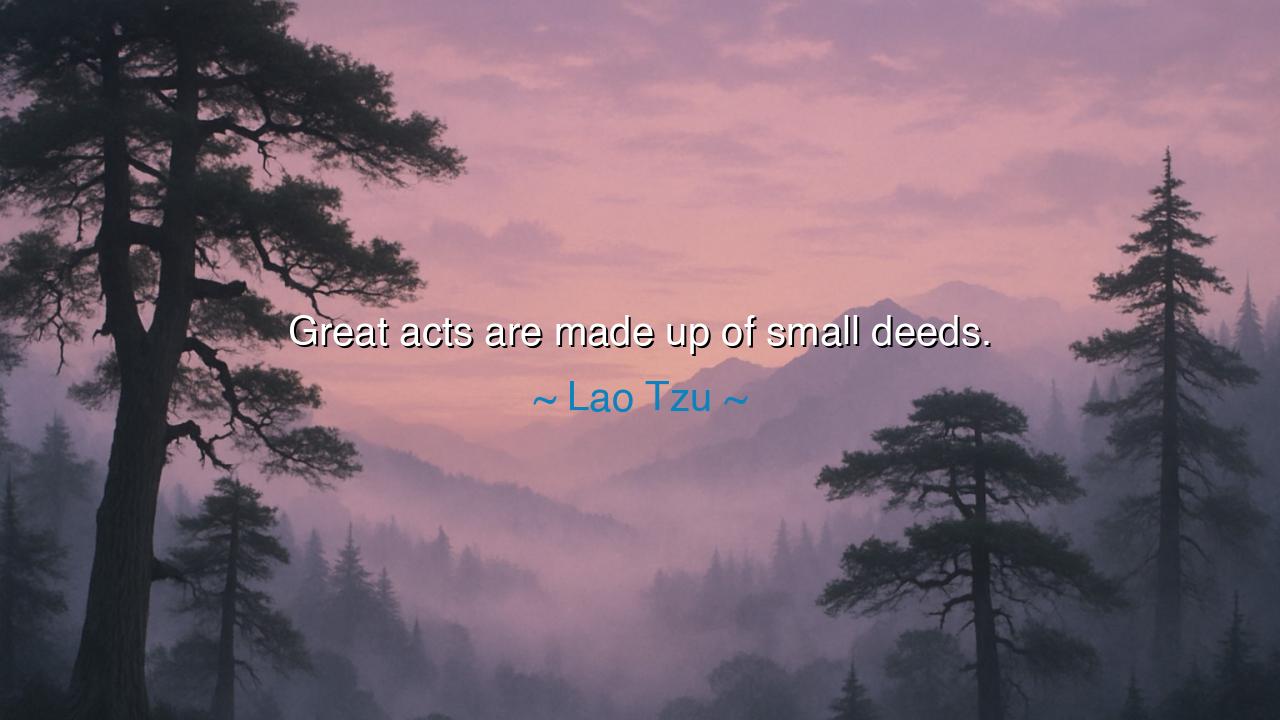
Great acts are made up of small deeds.






Hearken, O children of future generations, and attend to the words of Lao Tzu, the ancient sage of the East, who spoke with the quiet authority of one attuned to the currents of life: “Great acts are made up of small deeds.” In these simple words lies a profound truth that echoes through the ages: the grandeur of achievement is not born in a single stroke of brilliance, but in the patient, consistent accumulation of humble efforts. It is the drop of water, repeated again and again, that carves the deepest canyon; so too do small deeds shape the course of destiny.
From the dawn of human civilization, the ancients understood that the mightiest rivers began as trickling springs. The towering walls of Rome, the enduring pyramids of Egypt, the sweeping wisdom of Confucian and Buddhist teachings—all were the result of countless small actions, repeated with diligence and care. Lao Tzu reminds us that greatness is not instantaneous; it is the product of attention, patience, and daily devotion, where every small act contributes to the edifice of significance.
Consider the life of Florence Nightingale, who transformed the care of the sick and wounded not through a single grand gesture, but through innumerable acts of compassion, meticulous record-keeping, and tireless service. Each patient she tended, each improvement she implemented, seemed small at the moment, yet collectively, these deeds revolutionized nursing and healthcare, leaving a legacy that continues to benefit humanity. Here, Lao Tzu’s insight is made manifest: greatness emerges from the sum of humble actions executed with purpose.
The principle also extends to moral and ethical life. The wisdom of the ancients teaches that virtue is cultivated through repeated acts of kindness, patience, and honesty. A single moment of generosity is fleeting, but the consistent practice of small virtues creates character, builds trust, and shapes communities. Lao Tzu’s teaching illuminates the path of moral cultivation: the mighty oak grows from countless tiny acorns, and the great act of a life well-lived is composed of innumerable small deeds, each contributing to the whole.
History offers further exemplars: consider Mahatma Gandhi, whose philosophy of nonviolence and civil disobedience reshaped a nation and inspired the world. Gandhi’s greatness was not built on singular, spectacular acts alone, but on the daily practice of discipline, fasting, walking, teaching, and listening, all of which were small deeds in isolation, yet together produced a revolution of conscience. Here, the sage’s truth resonates clearly: small deeds, faithfully performed, accumulate into transformative greatness.
From this reflection emerges a profound lesson: do not undervalue your daily actions, however modest they may seem. Every kind word, every patient effort, every choice made with integrity contributes to the larger tapestry of life, shaping not only your destiny but the lives of those around you. Lao Tzu teaches that the journey toward greatness is walked in incremental steps, each deliberate and meaningful, rather than sudden leaps.
Practical guidance flows naturally: seek to act with intention in every moment, even in tasks that seem trivial. Perform small acts of service, generosity, and diligence with consistency. Recognize that the accumulation of these deeds builds the foundation of great achievements, and that enduring impact arises not from spectacle, but from steadfast commitment to what is right and meaningful.
Thus, O children of generations yet to come, let the wisdom of Lao Tzu guide your hearts: great acts are made up of small deeds. Strive to cultivate patience, diligence, and purpose in every action. Let your life be a mosaic of small, thoughtful efforts, each one a stone in the edifice of your legacy, for it is through these humble acts that greatness is achieved, remembered, and revered across the ages.






AAdministratorAdministrator
Welcome, honored guests. Please leave a comment, we will respond soon